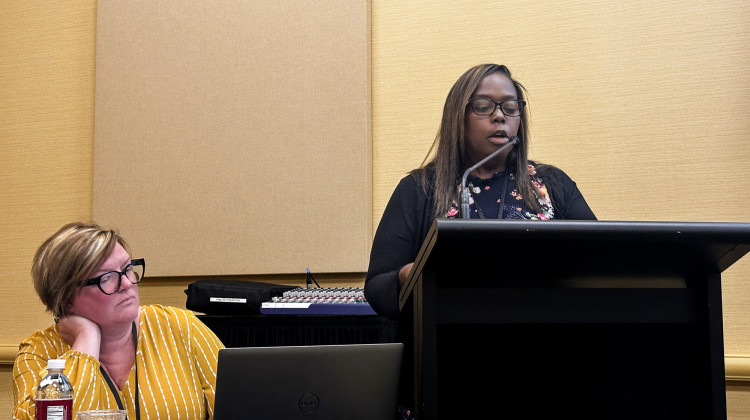
Ashley Coleman, a registered nurse who helped start the clinic, said the clinic also allows them to schedule patients for an appointment based on how far along the pregnancy is.
Abigail Ruhman / IPB NewsAn important aspect of lowering infant and maternal mortality rates is connecting pregnant people to prenatal care earlier. But that can be difficult in rural areas that are considered maternal care deserts. A hospital on the edge of Indiana’s largest obstetric care desert created a clinic to remove at least one barrier to that care.
Union Hospital in Terre Haute is the only level three certified perinatal hospital in an almost 80-mile radius and serves at least five counties. With only seven OB-GYNs on staff, the practice has a limited number of appointments.
Kristen Moore, the women's and children's service line director, said due to that limit, her hospital needs to confirm pregnancy before scheduling an appointment — but there isn’t much guidance on how to do that for patients.
“We had women in the community who were trying to figure out, ‘OK, I need a blood draw. I don't know what blood draw I need. I don't know where to go to do it,’” Moore said.
Moore said to address this barrier, Union Hospital developed a confirmation of pregnancy clinic. The clinic allows people to walk in and receive the correct type of test the same day. That visit can also include talking with a perinatal navigator who helps pregnant people through what prenatal care looks like.
Now, the people scheduling appointments will direct patients to the clinic to confirm there is a pregnancy and to begin the early steps of prenatal care.
Ashley Coleman, a registered nurse who helped start the clinic, said the clinic also allows them to schedule patients for an appointment based on how far along the pregnancy is.
“It is a place that we thought that we could get all patients established in care,” Coleman said. “It's a standardized process to get patients to get early prenatal care in the first trimester.”
Join the conversation and sign up for the Indiana Two-Way. Text "Indiana" to 765-275-1120. Your comments and questions in response to our weekly text help us find the answers you need on statewide issues and the election, including our project Civically, Indiana.
Coleman said the clinic has a nurse practitioner and a perinatal navigator to help people navigate care while they wait for that first appointment. The staff at the clinic will set up an appointment with an OB-GYN at Union Hospital for when the pregnancy is between eight to 12 weeks along.
The clinic launched in the last few months of 2022, and about 10 percent of deliveries at Union Hospital were routed through the clinic. In 2023, 64 percent of total deliveries at Union Hospital were routed through the clinic.
The providers behind the clinic said in the future they hope to have all patients routed through the clinic so they are able to complete first trimester risk assessments. These assessments identify perinatal risks that can contribute to maternal and infant mortality, such as gestational diabetes, hypertension or substance use disorder.
Abigail is our health reporter. Contact them at aruhman@wboi.org.
 DONATE
DONATE







 Support WFYI. We can't do it without you.
Support WFYI. We can't do it without you.